How Climate Racketeers Aim To Force Us Into Smart Gulags
Paul Cudenec
 Shocking evidence is emerging from Australia and New Zealand of how the climate scam is being used to impose a techno-totalitarian smart-city future. Shocking evidence is emerging from Australia and New Zealand of how the climate scam is being used to impose a techno-totalitarian smart-city future.
The criminocratic global imperialists often use their Commonwealth colonies to try out the most insidious escalations of their tyranny – think of Canada, New Zealand and Australia during Covid.
We can therefore assume that this is going to be the blueprint for the roll-out of their Fourth Industrial Revolution agenda across the world.
The sinister scheme in question, called “Managed Retreat”, has been exposed by independent researcher Kate Mason on her excellent Substack blog aimed at “deconstructing 4IR narratives”.
The idea is that exaggerated “modelling” of the imagined effects of “climate change” is being used to define certain areas as unsuitable for human settlement.
Working hand in hand with the state is the insurance industry – long a central part of the corrupt criminocratic empire – which deems homes in these areas to be “uninsurable”.
Banks are also playing their part (of course!) saying they are unwilling to provide mortgages for these “uninsurable” properties.
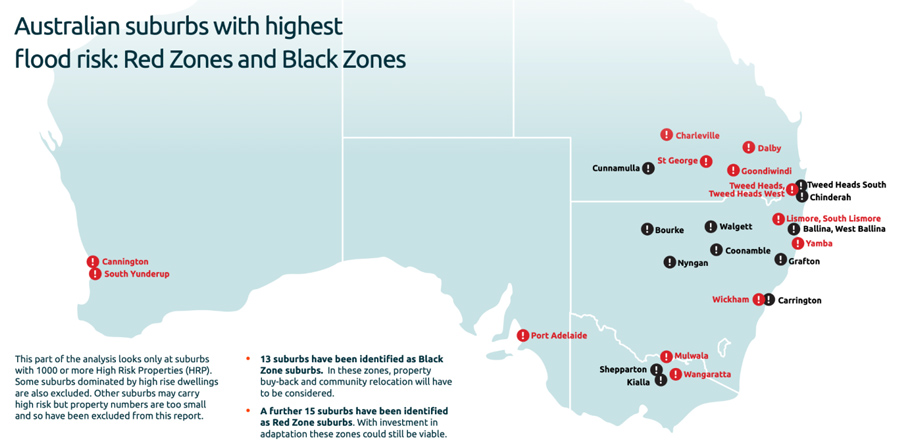
In her latest article, Kate refers to a TV report about Kensington Banks, near Melbourne city centre, which has been newly declared a flood zone.
She writes: “Property prices are expected to plummet by 20 percent. I think that’s rather conservative – who is going to buy in a flood zone? Unless it’s a developer who will raze it all to the ground and build a Smart Resilient complex”.
Meanwhile, in New Zealand, residents are up in arms about attempts to impose “retreat” from coastal areas under the pretext of a predicted rise in sea levels.
As this media report shows, they are not buying the scaremongering climate propaganda.
Tim Rees said. “I’ve lived by Paraparaumu Beach since 1965 and the beach is actually getting bigger. For 45 years I’ve dived off Kāpiti Island and the rocks are still at the same height at low tide”.
Added Tania Lees: “The science isn’t settled and there is no consensus. We don’t believe the sea levels are rising significantly and [that] we will all be flooded.”
Central and local government couldn’t fund “a process on this scale”, she said. “So far, the ratepayers have paid in excess of $4 million for the Takutai Kāpiti process.
“We simply can’t afford to spend more. If implemented, managed retreat would be in excess of $1 billion.”
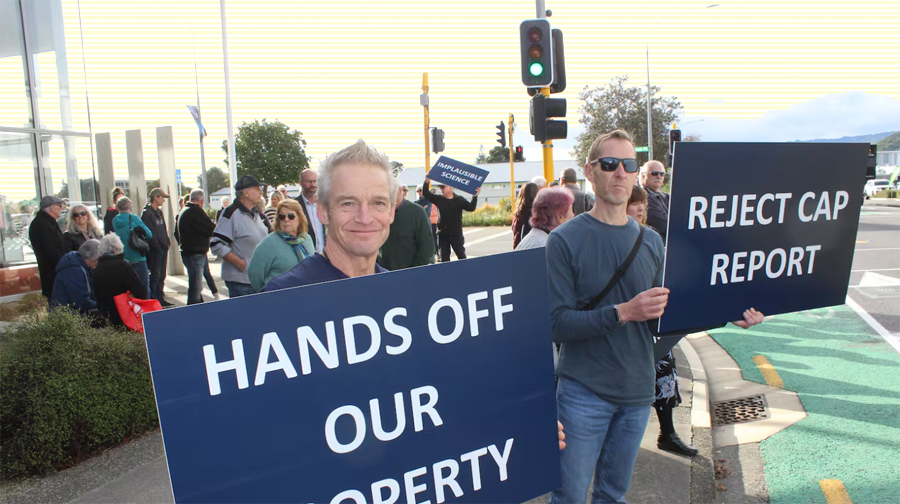
As for the agenda behind all this, Kate writes:
Finding the information on climate change modelling and insurance has joined the dots for me regarding the enormous amount of pack and stack housing developments going ahead in Australia.
They’re going to need to put us all somewhere when our houses are uninsurable and we have to sell them for a pittance.
It is clear that this is ‘Resilient’ Smart Cities. Everything hooked up to the internet and data collected, stored and used as modelling to dictate increasingly dystopian government measures of control and enforcement”.
By way of confirmation, she reveals that the Insurance Council of Australia, involved in Managed Retreat, works within the Public Private Partnership model and adheres to the United Nations Sustainable Development Goals, even being a foundation member of the United Nations Principles for Sustainable Insurance.
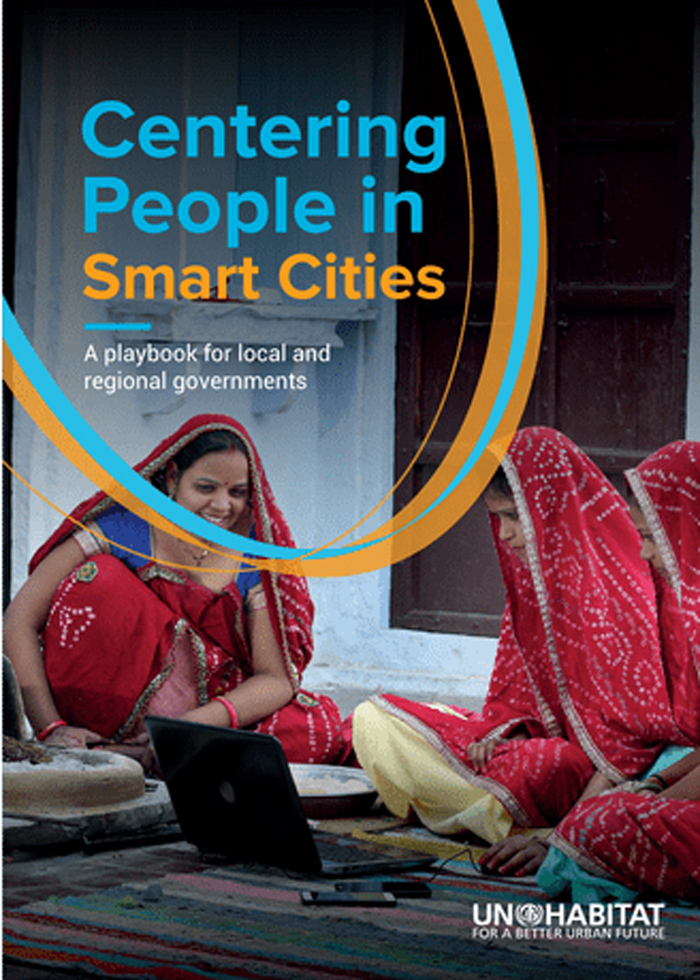
The UN’s smart gulag agenda was paraded in their 80-page booklet entitled “Centering People in Smart Cities: A playbook for local and regional governments”, as we reported in 2022.
Also in 2022, a body called the Australian Climate Council released a study which estimated that 1 in 25 of all homes and commercial buildings in the country would become effectively uninsurable by 2030 because of “worsening extreme weather events”.
River flooding posed the biggest risk, according to the study, with flash flooding and bushfires identified as the other main hazards contributing to properties becoming “uninsurable”.
As well as calling for “managed relocations”, the report stressed the need for “upscaling public investments in resilience” and to “support communities to ‘build back better’”.
It declared: “Towns, cities and communities must be rebuilt – where appropriate to do so – in a way that takes into account the inevitable future changes in climate and makes them more resilient”.
It comes as little surprise that this report was proudly showcased on the website of the World Economic Forum…
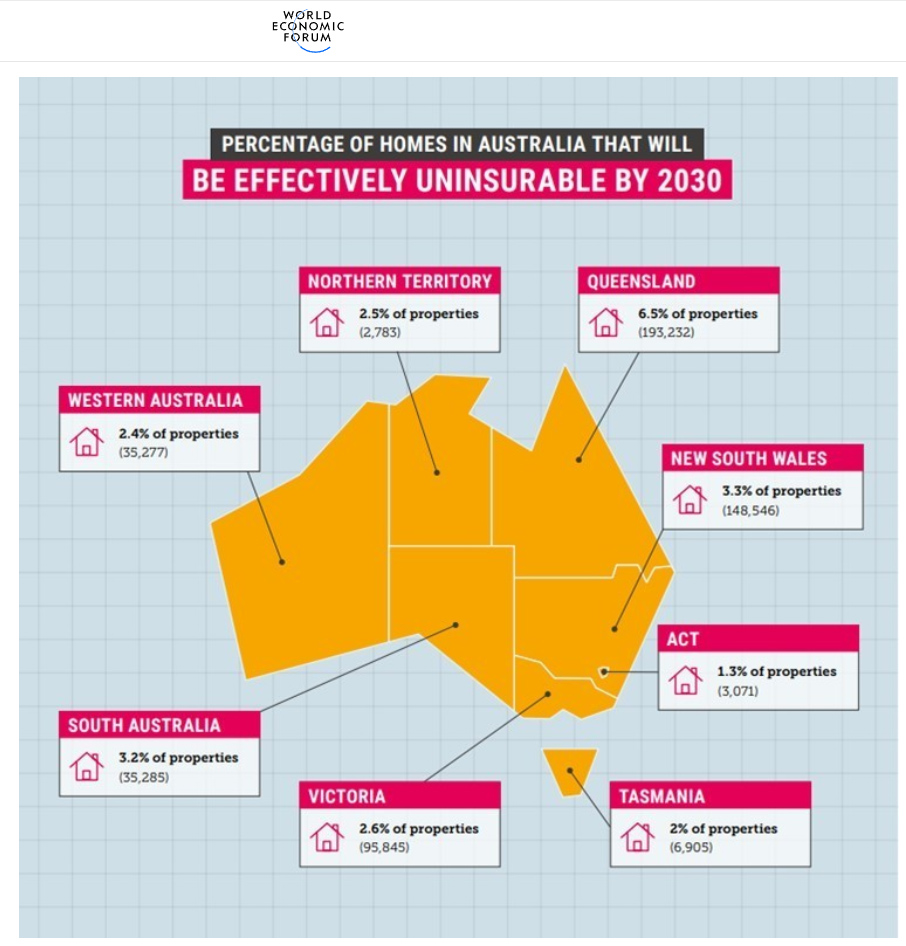
* * *
Originally published in the latest edition of The Acorn newsletter, you can read the full bulletin and subscribe HERE or follow Winter Oak on X/Twitter. The excellent SubStack which inspired it is written by Kate Mason, another recommended follow.
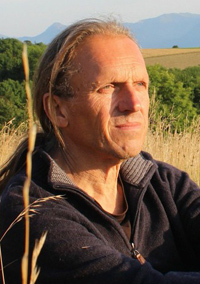
Paul Cudenec draws on an impressively wide range of authors to depict a corrupted civilization on the brink of self-destruction and to call for a powerful new philosophy of resistance and renewal offering a future for humanity in which we are all able to "be what we're meant to be". He combines the anarchism of the likes of Gustav Landauer, Michael Bakunin and Herbert Read with the philosophy of René Guénon, Herbert Marcuse and Jean Baudrillard; the existentialism of Karl Jaspers and Colin Wilson; the vision of Carl Jung, Oswald Spengler and Idries Shah, and the environmental insight of Derrick Jensen and Paul Shepard in a work of ideological alchemy fuelled by the ancient universal esoteric beliefs found in Sufism, Taoism and hermeticism. With a fusion of scholarly research and inspiring polemic, Cudenec succeeds in forging a coherent and profound 21st century world-view with an appeal that will reach out far beyond those who currently term themselves anarchists. The book sets out by exploring the sense of meaninglessness in modern society, exemplified by our alienating dependency on technology and mental manipulation by commercial interests. It follows Guénon, Marcuse and Baudrillard in diagnosing a regression of intellect and the reign of quality over quantity - a condition that Cudenec describes as the disease of modernity. He argues that the concepts of "progress" and economic "growth" imply the inevitability of one particular future - a continuation of the current system. Although environmental crisis threatens our very existence, change is blocked and democracy is an illusion. The repression of resistance is mirrored by the control of "reality". The closing-down of language and thought encouraged by the positivist philosophy is, as Marcuse and Jaspers explain, ideal for the capitalist system - denying as it does all possibility of human autonomy. What we need, says Cudenec, is a complete refusal of the system. Anarchism challenges assumptions about the law (Leo Tolstoy), property (William Godwin), employment (Bakunin) and the state (Errico Malatesta). It rejects the narrowness of positivism (Bakunin, Landauer) and imagines individuals' natural potential fulfilled in a harmonious organic society (Peter Kropotkin). Our innate human sense of justice is thwarted by capitalism, argues Cudenec, creating a powerful potential for revolt. But where, he asks, will the rebels come from to take on such a titanic struggle? He looks at the way a natural outsider (Wilson) can manage to turn the despair of alienation into acceptance of an existential burden of responsibility (Jean-Paul Sartre). An inner strength is needed to take on the "allotted task" (Jaspers), which presents itself as calling or "daemonic will" (Jung). This originates in the collective unconscious and acts for the benefit of whole - it is thus merely channelled by an individual, who must be open and authentic enough to allow this to happen. The universal esoteric spiritual path involves stripping away the ego's barrier between the individual and the collective whole (Ibn 'Arabi). With historic connections to this tradition (Sedgwick, Waterfield), anarchists use the language of alchemy to call for a transformation of society (Bakunin, Emma Goldman, Pierre-Joseph Proudhon). The anarchist love of seeming paradox reflects the depth and fluidity of the philosophy - in contrast to "rigid" Marxism (Landauer). Contradictions are embraced rather than resolved. Playfulness and creativity are also at the heart of anarchism and set it apart from materialist Marxism. The poetic language of revolt can bypass social conditioning and open up new possibilities. In his final chapter, "¡Viva la Revelación!", Cudenec concludes that a remarkable transformation is needed to save humanity. This will not come from existing religions - we need a spiritual awakening that speaks a "new language" (Jaspers) and is powered by its own values (Frithjof Schuon). This is The Anarchist Reve
off-guardian.org
| 

